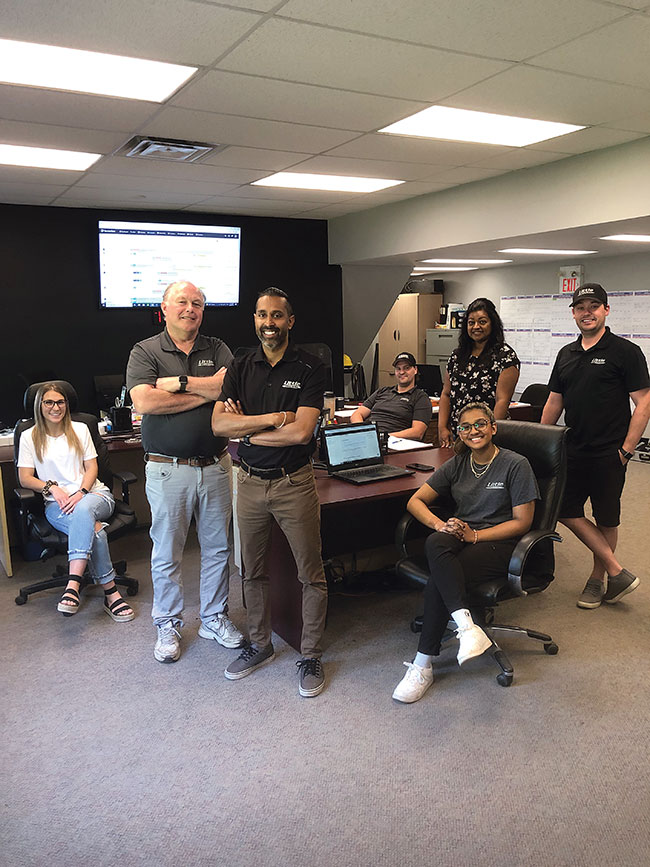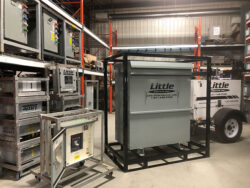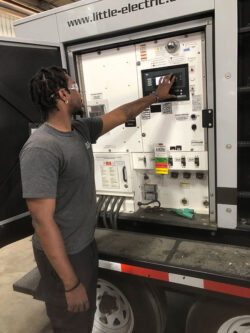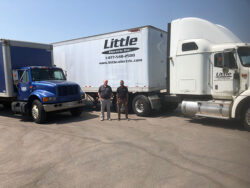
Electric legacy
By Treena Hein
Features ProfilesLittle Electric has been getting power to where it’s needed for over 100 years.
 Big screens stream real-time information about weather, the rental schedule, fleet availability, delivery status and more in the updated office.
all Photos: Canadian rental service staff
Big screens stream real-time information about weather, the rental schedule, fleet availability, delivery status and more in the updated office.
all Photos: Canadian rental service staff Imagine for a moment that you own a restaurant in a busy city or town. All is going well on this particular afternoon, but suddenly you’ve lost power. You find out a vehicle accident just happened at the intersection nearby, causing an outage that will take some time to repair. All the food in your fridges and freezers is going to spoil. Who do you call if you’re in southern Ontario? Very likely, Little Electric.
This Cambridge-based firm, started by Scott Little’s great grandfather, specializes in what’s called temporary power. The company not only swings into action for emergencies like the one just described, but also provides temporary power for a wide variety of industry scenarios and a huge number of festivals and events each year. In other words, the Little Electric team doesn’t only rent generators and other power-related equipment, but also hooks it all up, does repairs and much more. That’s because the team has eight electricians (including Little and co-owner Rakesh Singh as master electricians) and eight eager apprentices.
Scott’s great-grandfather, John Little, worked in the local rural areas in the early 1900s to bring electricity to buildings and businesses from a private water-driven power plant owned by a local company. As Ontario Hydro expanded its provincial power grid, private generating sources were replaced, while John and his sons (including Scott’s grandfather, James) worked to continue the initial electrification of the area.
After John’s death, most of his sons left to work in the booming U.S. auto industry and Scott’s grandfather, James, continued on, eventually working with his two sons, one being Scott’s father, Ray. Ray went on his own after World War II with electrical contracting for homes and businesses. A few of his customers had events in and around their buildings and, as the electrician for these businesses, he became involved in powering the equipment needed for the event, whether it be a trade show, festival or performance. Through a series of events, he ended up being more deeply involved than he intended and ended up buying and eventually renting our equipment over an ever-expanding area.
The business started doing wiring for festivals and stage shows in the 1950s and, in the decades after, renting out generators and more. Scott got his electrician license and had taken over for his father Ray for about a decade before Ray died many years ago.
Meanwhile, Singh, back in high school, had gotten his own DJ business going, showing early entrepreneurial spirit. One day a friend who worked for Scott asked Rakesh if he wanted some extra money. “I started doing general labour work after school and on the weekends for events and found I liked learning about electricity, the background of what went into powering my DJ equipment and larger productions,” he says. “I started an electrician apprenticeship at another company and still worked the odd time for Scott. Then, a few years later, I decided to ask Scott about working for him again full-time.”
It was 2006, and Singh quickly convinced Little there were very good opportunities in temporary power. Singh started growing that part of the business, little by little. “We both have our strengths,” says Little. “I do more technical support and Rakesh likes the hands-on but also the business development. I’m a technically-minded person. I like the variety of having different problems to solve.”
The collaboration has been s success. Due to its excellent work, Little Electric has never done a lot of advertising, growing by keeping lots of repeat customers and gaining new ones through word of mouth. “The business grew organically, I’d say,” explains Singh, “saying yes to more jobs and then working hard and long hours until we were at a level where we couldn’t keep up and it was the right time to hire another electrician. And then doing that again and again.”

Over the years, Little Electric has learned a lot about how to select, configure and package temporary power equipment so that it stands up to the demands of rental and delivery.
On the equipment side, Singh explains, “frequently we also sit down and look at our equipment and say ‘We could have used two more generators this year,’ for example, and then look at ROI. We also have grown our amount of distribution equipment, our amount of cable, transformers, electronic breakers, distribution panels, transfer switches, etcetera.”
Over the years, the team has grown from four to its present 25, from a 5,000 square-foot shop to one of 15,000 square feet. By 2013, Little was ready to look at a succession plan, and he and Singh started transitioning to a partnership.
On any particular day you might find a Little Electric crew hooking up testing equipment at a manufacturing plant for prototype testing. Or maybe another call has come in from a business that’s had its power knocked out. Some of the crew might be dropping off rental light towers and generators at a plant in preparation for a planned outage, or setting up power on a festival stage.
During COVID, these events and festivals obviously dropped to nothing for a while, but Little says, “The nice thing is that we’ve always had different areas that we can work in and they all cross over. So, even though there were no events, we picked up a lot of electrical contracting relating to home renovations, putting in pools and hot tubs, that sort of thing, along with commercial and industrial service.” This year, however, Little Electric expects to do about 60 festivals in addition to other indoor and outdoor events. They’ll also continue to deliver custom solutions.
Custom configurations

Javaughn McPherson checks to make sure every generator is rental-ready before it goes out the door. He’s one of a team of 25 employees.
About 15 years ago, the Little Electric crew started building custom electric equipment for a wide range of applications, and they now complete about 100 projects a year.
“A lot of our rented equipment we’ve built ourselves,” Singh explains. “These units are easy to set up, plug-and-play, framed in custom enclosures so they don’t get damaged and they transport well. The different configurations can include transformers, electronic breakers, distribution panels and transfer switches. The customer comes to us with a specific request, with dimensions and what they need the equipment to do. There are usually restrictions on accessibility for connection, or a need to shield the unit from the elements.”
Through experience, Little Electric is turning itself into an expert in building custom power distribution equipment. Little reports, “We’re actually working towards having a steady, dedicated team just for this, making units for rental or for sale, or modifying what the customer has. The specifics can vary a great deal, and so do the customers. You can have facilities that have ongoing events, for instance they’ll have a food truck or two coming in every weekend for the summer. We also supply transformers so that companies here can test equipment to go overseas or so they can power equipment that came here from overseas.”
Challenges

Adding transportation capacity has been a big part of Little Electric’s growth. The company prides itself on being able to react quickly to customer emergencies such as power outages.
Most of the challenges for Little Electric have come from growth (specifically, the need to hire more electricians) and Little and Singh are sure that growth will continue. They think growth will come from new events and festivals, but also small construction projects and all the rest of their divisions. “But,” they explain, “to move up from our 25 employees to the next tier, there’s a lot of moving parts to sort out. A bigger building, more hiring. It’s exciting and we haven’t found that we’ve got a lot of competition. There has been a lot of mergers and acquisitions that have happened by the chains. And we actually do a fair amount of subcontracting work for them as we’re licenced electricians and they aren’t, so there are good relationships there.”
Both Little and Singh want to recognize their experienced and dedicated staff members, whom they highly value. “We have low turnover,” says Rakesh. “We go above and beyond for our staff. We do social nights at restaurants and BBQs here, and we have monthly townhall meetings to talk about how it’s going, what they need, any concerns.”
“Every day brings a new challenge,” says Little. “Some are more routine the others, but we’re always solving things for people and we’re very good at it. Our experience shows through. If you have that experience, people know they can rely on you. We get a lot of positive feedback and we are very proud of what we have built.”
Print this page
Leave a Reply